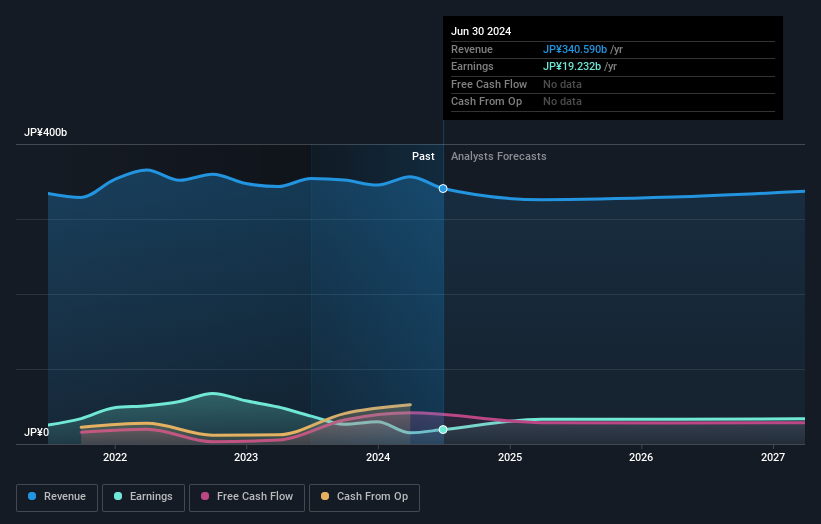- Japan
- /
- Entertainment
- /
- TSE:9684
Institutions own 33% of Square Enix Holdings Co., Ltd. (TSE:9684) shares but individual investors control 36% of the company

Key Insights
- The considerable ownership by individual investors in Square Enix Holdings indicates that they collectively have a greater say in management and business strategy
- 50% of the business is held by the top 8 shareholders
- 25% of Square Enix Holdings is held by insiders
To get a sense of who is truly in control of Square Enix Holdings Co., Ltd. (TSE:9684), it is important to understand the ownership structure of the business. We can see that individual investors own the lion's share in the company with 36% ownership. Put another way, the group faces the maximum upside potential (or downside risk).
Institutions, on the other hand, account for 33% of the company's stockholders. Large companies usually have institutions as shareholders, and we usually see insiders owning shares in smaller companies.
Let's delve deeper into each type of owner of Square Enix Holdings, beginning with the chart below.
View our latest analysis for Square Enix Holdings

What Does The Institutional Ownership Tell Us About Square Enix Holdings?
Institutional investors commonly compare their own returns to the returns of a commonly followed index. So they generally do consider buying larger companies that are included in the relevant benchmark index.
We can see that Square Enix Holdings does have institutional investors; and they hold a good portion of the company's stock. This can indicate that the company has a certain degree of credibility in the investment community. However, it is best to be wary of relying on the supposed validation that comes with institutional investors. They too, get it wrong sometimes. It is not uncommon to see a big share price drop if two large institutional investors try to sell out of a stock at the same time. So it is worth checking the past earnings trajectory of Square Enix Holdings, (below). Of course, keep in mind that there are other factors to consider, too.

Hedge funds don't have many shares in Square Enix Holdings. Looking at our data, we can see that the largest shareholder is Yasuhiro Fukushima with 25% of shares outstanding. For context, the second largest shareholder holds about 5.4% of the shares outstanding, followed by an ownership of 4.6% by the third-largest shareholder.
We did some more digging and found that 8 of the top shareholders account for roughly 50% of the register, implying that along with larger shareholders, there are a few smaller shareholders, thereby balancing out each others interests somewhat.
While studying institutional ownership for a company can add value to your research, it is also a good practice to research analyst recommendations to get a deeper understand of a stock's expected performance. Quite a few analysts cover the stock, so you could look into forecast growth quite easily.
Insider Ownership Of Square Enix Holdings
While the precise definition of an insider can be subjective, almost everyone considers board members to be insiders. Company management run the business, but the CEO will answer to the board, even if he or she is a member of it.
I generally consider insider ownership to be a good thing. However, on some occasions it makes it more difficult for other shareholders to hold the board accountable for decisions.
Our most recent data indicates that insiders own a reasonable proportion of Square Enix Holdings Co., Ltd.. Insiders own JP¥177b worth of shares in the JP¥698b company. That's quite meaningful. Most would say this shows a good degree of alignment with shareholders, especially in a company of this size. You can click here to see if those insiders have been buying or selling.
General Public Ownership
The general public, who are usually individual investors, hold a 36% stake in Square Enix Holdings. While this size of ownership may not be enough to sway a policy decision in their favour, they can still make a collective impact on company policies.
Private Company Ownership
It seems that Private Companies own 5.4%, of the Square Enix Holdings stock. It's hard to draw any conclusions from this fact alone, so its worth looking into who owns those private companies. Sometimes insiders or other related parties have an interest in shares in a public company through a separate private company.
Next Steps:
It's always worth thinking about the different groups who own shares in a company. But to understand Square Enix Holdings better, we need to consider many other factors. Case in point: We've spotted 2 warning signs for Square Enix Holdings you should be aware of.
Ultimately the future is most important. You can access this free report on analyst forecasts for the company.
NB: Figures in this article are calculated using data from the last twelve months, which refer to the 12-month period ending on the last date of the month the financial statement is dated. This may not be consistent with full year annual report figures.
New: Manage All Your Stock Portfolios in One Place
We've created the ultimate portfolio companion for stock investors, and it's free.
• Connect an unlimited number of Portfolios and see your total in one currency
• Be alerted to new Warning Signs or Risks via email or mobile
• Track the Fair Value of your stocks
Have feedback on this article? Concerned about the content? Get in touch with us directly. Alternatively, email editorial-team (at) simplywallst.com.
This article by Simply Wall St is general in nature. We provide commentary based on historical data and analyst forecasts only using an unbiased methodology and our articles are not intended to be financial advice. It does not constitute a recommendation to buy or sell any stock, and does not take account of your objectives, or your financial situation. We aim to bring you long-term focused analysis driven by fundamental data. Note that our analysis may not factor in the latest price-sensitive company announcements or qualitative material. Simply Wall St has no position in any stocks mentioned.
About TSE:9684
Square Enix Holdings
Operates in the content and service businesses in Japan and internationally.
Flawless balance sheet second-rate dividend payer.

